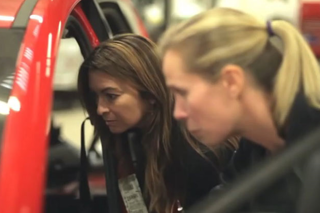According to Eurostat, just 16% of the automotive retail workforce is made up of women.
If we are to transform the industry into the modern, forward thinking, gender-balanced and successful industry that we believe it can be, this needs to change.
However, simply having the will to do this is not enough. Change is achieved by identifying and then correcting the issues that have caused this low percentage in the first place.
Something which we have started to do, but the industry needs to work hard to debunk misleading perceptions and lead the way in achieving gender equality in the workplace to attract this generation’s most talented workers.
Initially, there are a number of stumbling blocks to consider. One is female perception according to the research we conducted; as little as 5% of women outside of the industry perceive the car industry as having a warm, friendly environment, likely affected by the experience women have as consumers going into an automotive retail environment.
Equality of pay: an industry lure
There is a greater emphasis on this perception issue when we recognise that there is not a gender pay gap problem within the automotive industry compared to other sectors.
This equality in pay should be used to our advantage to attract more women in the first instance. We can, and should, use parity in salary as well as flexible working and different compositions of pay to change the way people outside of the industry view automotive.
Although the issues surrounding pay can be tackled through fair remuneration packages, changing out-dated perceptions of the industry will be a far trickier process.
This will rely on our ability to show the rest of the UK that our industry is more closely aligned with retail in the way we place a strong focus on customer services and delivering exceptional experiences.
Debunking inequality myths
The experiences of colleagues in our business are very different. We have seen many of our team grow and thrive in their positions from different backgrounds as we encourage people to use their unique skills to make their own mark.
There are examples of people within our ranks who have transferred from other industries as well as retail to Jardine Motors and completely changed the demographic of the workforce.
In some cases this has resulted in a positive increase of women in the workforce – as much as 40% in one dealership.
Outcomes such as this fly in the face of external perceptions. Our own research found that as little as 3% of those not plying their trade within the sector believe there are plenty of opportunities to progress compared to 40% from inside the automotive retail industry.
Unsurprisingly, with misconceptions such as this it follows that just 15% of women outside of automotive and a quarter (25%) of men were willing to consider a job in automotive retail.
This is in sharp contrast to 85% of women and 73% of men inside the industry that would recommend it to a friend.
Recruitment: thinking differently
However, combating this cannot simply be a case of waiting for reputation to transform.
Recruitment strategy, incentives and employment packages must be reviewed and, where necessary, changed.
For instance, we have tried, tested and implemented new recruitment techniques to address this imbalance.
As a result, our Jardine Academy is certainly proving to be a success for balancing the genders in our teams. Our latest intake is helping us to fulfil our ambitions of bringing more women into our industry.
In addition we are embracing new technology and techniques such as video assessments, and prioritising candidate personality over their CV.
All progress suggests that this has helped break down the well documented barriers that have long existed in automotive.
Shifting the work/life balance
Finally, reviewing working hours and shift patterns is also on the cards as 66% of those working outside the industry said hours to suit their lifestyle are among the most important factors to consider when looking for a job.
Due to the nature of our industry it might seem that this will be impossible, but there is a middle ground that can offer flexible time to suit our employees, and deliver a better service to customers when they are looking online at new cars or need to drop off or collect serviced vehicles.
If we are to bring gender balance in our industry we must work about the industry and provide modern methods of working to attract the next generation of top talent.
The changes we have made are already having an impact – in our annual externally facilitated employee survey 87% of our team responded and we achieved an engagement score of 90% which is a tremendous result.
However, to address the shortage of women we cannot stop there.
Once we have solved these issues we must never stop listening and acting on the suggestions and sentiments of our employees as well as those of the wider UK to ensure that we are changing perceptions and removing bias that exist within many businesses.
Author: Clare Martin, group HR director at Jardine Motors Group

















Login to comment
Comments
No comments have been made yet.